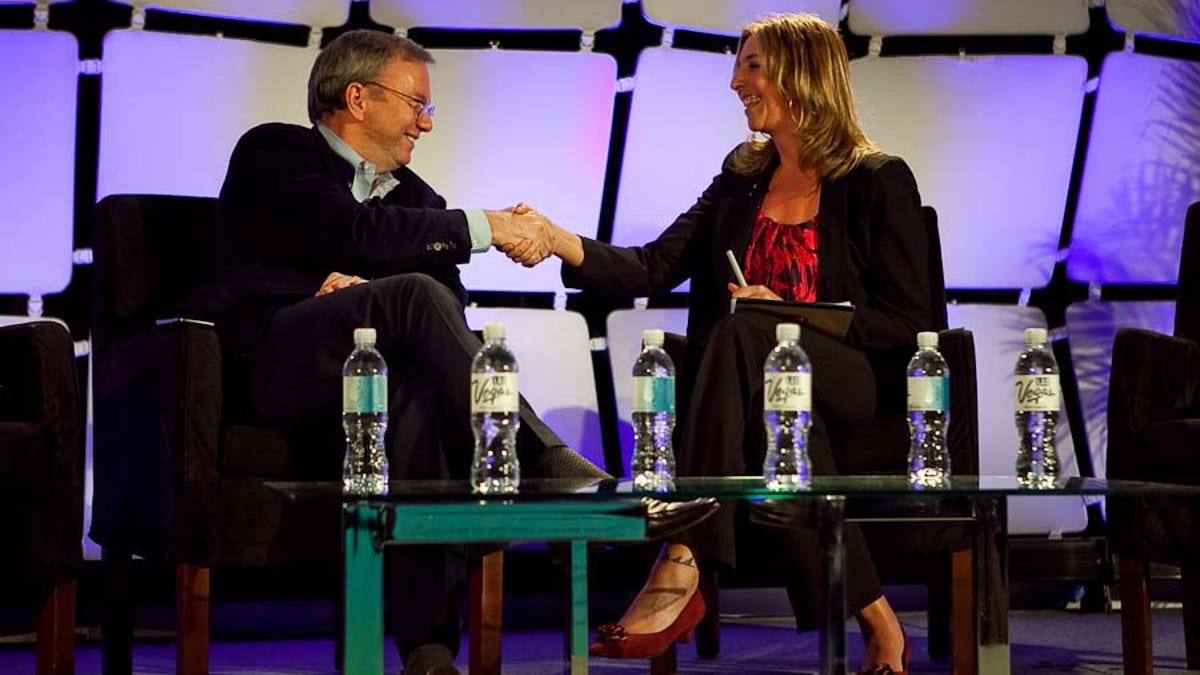The Next Big Thing: Android in the home, and in the fridge
Execs from Google, Samsung, Sling Media, and Benchmark Capital discuss Google's aggressive Android strategy and the challenges of "fragmentation."

Nearly every device in your house, from your television to your refrigerator, is going to be networked and could very well be Android-powered, panelists said today at a CNET CES event in Las Vegas.
Of course you'd expect Eric Schmidt, executive chairman of Google, to say that. But the vision was also endorsed by executives at Google partner Samsung, Sling Media, and Benchmark Capital, who spoke to CNET's Brian Cooley and Molly Wood about ecosystem trends. Here's what they said.
Eric Schmidt, Google executive chairman
The smartphone will become the portal to other devices and appliances in the home, which will all work together seamlessly and allow access to whatever type of information you want anywhere in the house. It's already happening, with Wi-Fi being used now to control lights in houses.
Google's strategy is to move the focus from mobile devices to a more encompassing utilitarian function that shares information and intelligence much like peer-to-peer devices do. "You want to be able to walk into your house and have all the appliances adjust, know it's you," Schmidt said. "A text message goes to the TV because that's your preference" and it all syncs together.
An early foray is the TV. Google TV (offered by LG and soon Samsung, Sony and others) represents a melding of the computer with Android apps and the TV. "Google TV is the only offering I know of that fully integrates the television experience and the browsing experience," Schmidt said.
Asked if the fragmentation of the Android market, with so many different makes and models of devices, was a threat to the ecosystem, Schmidt said he preferred "differentiation" rather than "fragmentation" and argued that consumers want choice. "Fragmentation means the app only runs on one device and not the others. That is not happening to Android," he said. "Competition provides value, drives cost down, etc. etc."
As far as the most surprising thing he saw in 2011, Schmidt said he was surprised to see how powerful ecosystems can be. "Amazon, Apple, even the Facebook ecosystem, which have similar characteristics in this regard, as well as Google,... everyone is working against this cloud platform model. It means everyone is a winner...and you get enormous growth effects. The secret is to make them open enough...to enable the creative people, the content creators, developers...to love them."
Tim Baxter, president of sales, marketing, and operations for Samsung Electronics America
Samsung's job is to provide device choices to the market and leverage its expertise in the consumer market to create products for businesses as well, he said.
"We are not a cloud infrastructure company. We are an entertainment company. We are a company that is focused on adding value in hardware and recognizing the industry, the market, and consumer expectations that have radically shifted from discrete devices to connected devices," he said. "People want choices, and we are about giving them choices."
Blake Krikorian, Sling Media co-founder and Amazon board member
"Fragmentation will continue to be the challenge as well as the strength for the (Android) platform," he said. "Android will have growing pains." (Krikorian used to work with Andy Rubin, Android Inc. co-founder and senior vice president of mobile at Google, and at mobile firm General Magic.)
Meanwhile, Krikorian said Android works well for home automation but iOS doesn't. "I didn't want to have to swipe the damn thing to make it work."
Bill Gurley, general partner at Benchmark Capital
"I think Google's Android execution may be the most aggressive strategic initiative in the history of (tech) business," he said, while Google also has succeeded in protecting its search empire. "It's amazing the momentum they have."
In addition, Google has been smart about investing in developer relations. "What Google is doing with Android, it's going to destroy a lot of market cap. It's already happened with RIM and Symbian."
Apple, meantime, has alienated partners. "Apple made one mistake, they haven't made many," he said. "They got greedy on the rake (commission)," of 30 percent. They alienated Amazon and Facebook.... They should have made them their best friend and had them deeply integrated in the operating system like Twitter is.... now we've got a multifaceted war."

